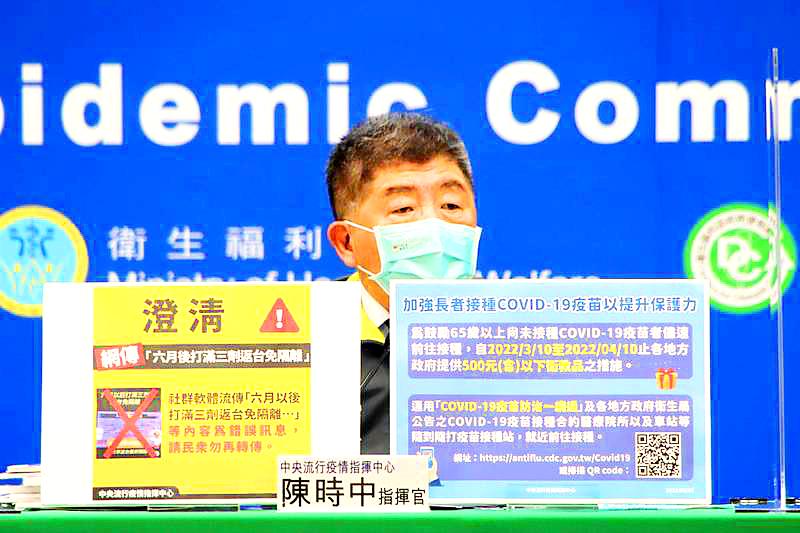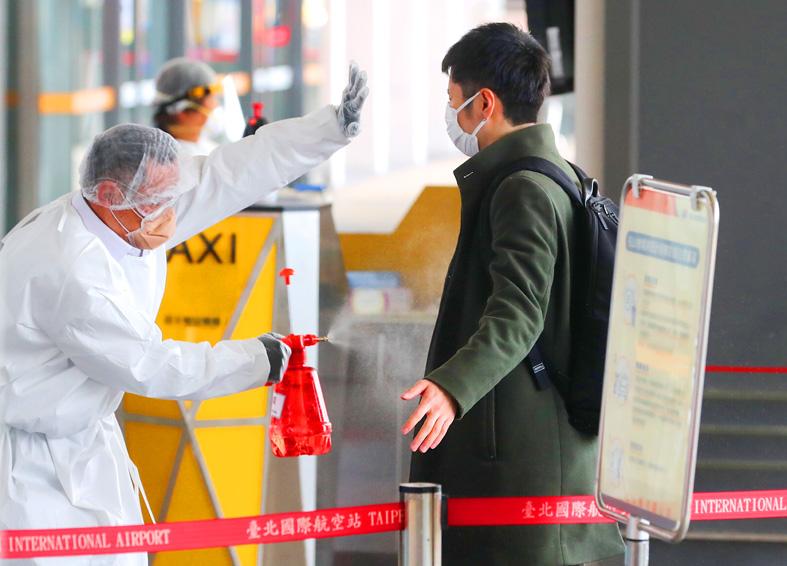Local governments can offer older people an incentive worth up to NT$500 for being vaccinated against COVID-19 from Thursday to April 10, the Central Epidemic Command Center (CECC) said yesterday.
Minister of Health and Welfare Chen Shih-chung (陳時中), who heads the center, said that to encourage people aged 65 or older to get vaccinated against COVID-19, local governments can offer them an incentive worth up to NT$500 when they receive a first, second or third vaccine dose.
Shinkong Wu Ho-su Memorial Hospital vice superintendent Hung Tzu-jen (洪子仁) told the center’s daily briefing that in the UK, 5,482 of the 3.03 million people infected with COVID-19 between Dec. 12 last year and Jan. 16 died, a case fatality rate (CFR) of 0.18 percent.

Photo courtesy of the CECC
A breakdown of the deaths by age and vaccination status showed that the CFR increased as the age group of the unvaccinated patients rose, he said.
While the CFR for unvaccinated patients under 18 years old was 0.002 percent, it increased to 9.66 percent for unvaccinated patients in their 70s, and to 23.558 percent for unvaccinated patients aged 80 or older, he added.
Fatalities were fewer among patients who received a booster dose, even in higher age groups, with a CFR of zero for patients under 18 years old to a CFR of 2.94 percent for patients aged 80 or older, he said.

Photo: CNA
In the group of patients aged 60 years or older, the CFR for unvaccinated patients was 11 times the CFR for patients of the same age group who received a booster, he added.
“A similar situation has been observed in Hong Kong,” Hung said.
However, of 1,153 deaths in Hong Kong between Jan. 1 and Saturday, only 92 people (8 percent) had received two vaccine doses, while 1,061 people (92 percent) were not fully vaccinated, he said.
The CFR for patients not fully vaccinated was 1.25 percent, 31 times the CFR for fully vaccinated patients, he said.
A breakdown by age and vaccination status showed that the CFR for those not fully vaccinated was several times higher than for those fully vaccinated: 20.5 times for those in their 50s, 17.7 times for those in their 60s, 9.5 times for those in their 70s, and 9.5 times for those aged 80 or older, Hung said.
Among Hong Kongers aged 80 or older, 51.15 percent have received a first dose, 30.93 percent a second dose and 1.6 percent a booster dose, Hung said.
Among Taiwanese aged 75 or older, 75.5 percent have received a first dose, 69.9 percent a second dose and 50.1 percent a booster dose, he said.
While the rates among older Taiwanese are higher than in Hong Kong, they are lower than among younger Taiwanese, he added.
“Generally, the CFR for people under the age of 50 is relatively low, regardless of their vaccination status, but it is clearly different in older people,” Hung said.
“Young people mainly get vaccinated to prevent the virus from spreading and to protect older people, but older people mainly get vaccinated to protect themselves, especially from severe complications and hospitalization,” Hung added.
Chen said that as of Sunday, the first-dose COVID-19 vaccination rate in Taiwan had reached 82.96 percent, full vaccination coverage was 77.17 percent and the booster dose rate was 44.4 percent.
Meanwhile, starting yesterday, the quarantine period was cut from 14 to 10 days for people who are required to isolate after coming into contact with infected individuals, as well as for all arrivals to Taiwan, including business travelers.
Additional reporting by CNA

US President Donald Trump yesterday announced sweeping "reciprocal tariffs" on US trading partners, including a 32 percent tax on goods from Taiwan that is set to take effect on Wednesday. At a Rose Garden event, Trump declared a 10 percent baseline tax on imports from all countries, with the White House saying it would take effect on Saturday. Countries with larger trade surpluses with the US would face higher duties beginning on Wednesday, including Taiwan (32 percent), China (34 percent), Japan (24 percent), South Korea (25 percent), Vietnam (46 percent) and Thailand (36 percent). Canada and Mexico, the two largest US trading

AIR SUPPORT: The Ministry of National Defense thanked the US for the delivery, adding that it was an indicator of the White House’s commitment to the Taiwan Relations Act Deputy Minister of National Defense Po Horng-huei (柏鴻輝) and Representative to the US Alexander Yui on Friday attended a delivery ceremony for the first of Taiwan’s long-awaited 66 F-16C/D Block 70 jets at a Lockheed Martin Corp factory in Greenville, South Carolina. “We are so proud to be the global home of the F-16 and to support Taiwan’s air defense capabilities,” US Representative William Timmons wrote on X, alongside a photograph of Taiwanese and US officials at the event. The F-16C/D Block 70 jets Taiwan ordered have the same capabilities as aircraft that had been upgraded to F-16Vs. The batch of Lockheed Martin

China's military today said it began joint army, navy and rocket force exercises around Taiwan to "serve as a stern warning and powerful deterrent against Taiwanese independence," calling President William Lai (賴清德) a "parasite." The exercises come after Lai called Beijing a "foreign hostile force" last month. More than 10 Chinese military ships approached close to Taiwan's 24 nautical mile (44.4km) contiguous zone this morning and Taiwan sent its own warships to respond, two senior Taiwanese officials said. Taiwan has not yet detected any live fire by the Chinese military so far, one of the officials said. The drills took place after US Secretary

THUGGISH BEHAVIOR: Encouraging people to report independence supporters is another intimidation tactic that threatens cross-strait peace, the state department said China setting up an online system for reporting “Taiwanese independence” advocates is an “irresponsible and reprehensible” act, a US government spokesperson said on Friday. “China’s call for private individuals to report on alleged ‘persecution or suppression’ by supposed ‘Taiwan independence henchmen and accomplices’ is irresponsible and reprehensible,” an unnamed US Department of State spokesperson told the Central News Agency in an e-mail. The move is part of Beijing’s “intimidation campaign” against Taiwan and its supporters, and is “threatening free speech around the world, destabilizing the Indo-Pacific region, and deliberately eroding the cross-strait status quo,” the spokesperson said. The Chinese Communist Party’s “threats